2009, Wimbledon
Wimbledon, Great Britain
June 22 – July 5, 2009; 128 Draw (32 seeds); Surface – Grass
A retractable roof was used for the first time, the defending champion Rafael Nadal withdrew due to knee problems, and Roger Federer captured his sixth Wimbledon crown after the longest five-set Grand Slam final in history in terms of the number of games. Andy Roddick lost his fourth (and last) Grand Slam final in a row, every time being beaten by Federer (third time at Wimbledon). Ivo Karlovic established a new record – 129 held games not being broken (80 at Wimbledon) while Tommy Robredo almost equaled Roddick’s record for the most consecutive tie-breaks won.
First round: (Guardian)
Roger Federer created yet another Wimbledon record today by becoming the first player in the Open era to launch the Championships on Centre Court in six successive years. The result, predictably, was the same as the previous five – a seemingly effortless straight sets triumph. The only thing different before the former champion breezed past Tapiei’s Yen-Hsun Lu 7-5, 6-3, 6-2 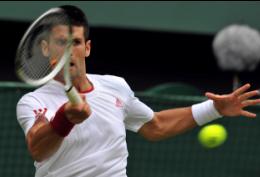 in just over an hour and three-quarters was Federer’s latest extraordinary pre-match parade on to Centre, apparently dressed for a fashion show rather than a tennis match. Fourth-seeded Novak Djokovic had to rally from a set down on Monday in a surprisingly tough first-round match with Julien Benneteau, who needed an injury timeout in the final game after smashing into the Centre Court wall. The 2008 Australian Open champion needed 3 1/2 hours to overcome the 81st-ranked Benneteau 6-7(8), 7-6(1), 6-2, 6-4. The Serb squandered two set points in the opening tie-break. “Maybe it’s good that I got some longer rallies at the start of the tournament,” said Djokovic, who reached the final at the Halle grass-court tournament a week ago. “I knew I would have to work for most of the points throughout the match because of the quality of my opponent. When you play best of five, it’s important to be physically fit, and convinced and confident in yourself so you can rely on your strength in long matches.” The players said the fresh grass was slippery, and Benneteau also needed treatment after losing his footing and falling awkwardly in the 3rd set, twisting his hip. The first two sets resembled a clay-court match, with long baseline rallies as the 27-year-old Benneteau matched Djokovic stroke for stroke. The Frenchman won the tense first-set tiebreaker by wrong footing the Serb after supplying a deft drop shot. Djokovic took early control of the second tiebreaker, however, mixing the pace and winning with a commanding backhand down the line. Djokovic finally broke the tiring Benneteau’s serve for the first time in the 2nd game of the 3rd set. He raced to a 5:0 lead before losing concentration and allowing Benneteau to earn two games in a row. But the Frenchman then hit a forehand wide to hand Djokovic the set. Benneteau saved a break point at 4:3 down in the 4th set, but couldn’t hold his serve the next time. Chasing a lob at full speed, Benneteau slipped when he tried to pull up and crashed into the wall behind the baseline, thumping his knees. The 17th seed, James Blake, became the first high-profile casualty at this year’s Wimbledon, going out in straight sets to Andreas Seppi of Italy 5-7, 4-6, 6-7(5). Seppi, the world No. 50, has a reasonable record on grass, having won more than he has lost on the surface, and two years ago he beat Murray at Nottingham. But he is a surprise victor over Blake, who just a week ago showed tremendous form on grass to reach the final of Queen’s, where he lost to Murray. Blake looked all at sea against Seppi’s powerful strokes off both wings from the baseline and lost the 1st set in 44 minutes. Seppi, who has never got past the third round in his previous four visits to Wimbledon, showed superior movement again in the 2nd set and needed just 35 minutes more to double his lead. Blake stormed to a 5:0 lead in the 3rd-set tie-break but then Seppi rattled off seven straight points to book his place in round two where he will meet France’s Marc Gicquel, who defeated compatriot Adrian Mannarino, also in straight sets, 6-2, 6-2, 6-4. Spain’s Feliciano Lopez was
in just over an hour and three-quarters was Federer’s latest extraordinary pre-match parade on to Centre, apparently dressed for a fashion show rather than a tennis match. Fourth-seeded Novak Djokovic had to rally from a set down on Monday in a surprisingly tough first-round match with Julien Benneteau, who needed an injury timeout in the final game after smashing into the Centre Court wall. The 2008 Australian Open champion needed 3 1/2 hours to overcome the 81st-ranked Benneteau 6-7(8), 7-6(1), 6-2, 6-4. The Serb squandered two set points in the opening tie-break. “Maybe it’s good that I got some longer rallies at the start of the tournament,” said Djokovic, who reached the final at the Halle grass-court tournament a week ago. “I knew I would have to work for most of the points throughout the match because of the quality of my opponent. When you play best of five, it’s important to be physically fit, and convinced and confident in yourself so you can rely on your strength in long matches.” The players said the fresh grass was slippery, and Benneteau also needed treatment after losing his footing and falling awkwardly in the 3rd set, twisting his hip. The first two sets resembled a clay-court match, with long baseline rallies as the 27-year-old Benneteau matched Djokovic stroke for stroke. The Frenchman won the tense first-set tiebreaker by wrong footing the Serb after supplying a deft drop shot. Djokovic took early control of the second tiebreaker, however, mixing the pace and winning with a commanding backhand down the line. Djokovic finally broke the tiring Benneteau’s serve for the first time in the 2nd game of the 3rd set. He raced to a 5:0 lead before losing concentration and allowing Benneteau to earn two games in a row. But the Frenchman then hit a forehand wide to hand Djokovic the set. Benneteau saved a break point at 4:3 down in the 4th set, but couldn’t hold his serve the next time. Chasing a lob at full speed, Benneteau slipped when he tried to pull up and crashed into the wall behind the baseline, thumping his knees. The 17th seed, James Blake, became the first high-profile casualty at this year’s Wimbledon, going out in straight sets to Andreas Seppi of Italy 5-7, 4-6, 6-7(5). Seppi, the world No. 50, has a reasonable record on grass, having won more than he has lost on the surface, and two years ago he beat Murray at Nottingham. But he is a surprise victor over Blake, who just a week ago showed tremendous form on grass to reach the final of Queen’s, where he lost to Murray. Blake looked all at sea against Seppi’s powerful strokes off both wings from the baseline and lost the 1st set in 44 minutes. Seppi, who has never got past the third round in his previous four visits to Wimbledon, showed superior movement again in the 2nd set and needed just 35 minutes more to double his lead. Blake stormed to a 5:0 lead in the 3rd-set tie-break but then Seppi rattled off seven straight points to book his place in round two where he will meet France’s Marc Gicquel, who defeated compatriot Adrian Mannarino, also in straight sets, 6-2, 6-2, 6-4. Spain’s Feliciano Lopez was 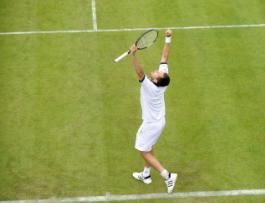 another seed to lose today, coming out second best in a marathon match against “lucky loser” (replaced Baghdatis) Karol Beck of Slovakia 6-1, 5-7, 3-6, 6-4, 8-10. The Spaniard thought he would battle through to the second round after winning the fourth set to tie the match but lost an epic fifth set. ‘LaLo’ had match point at 7:6*, Beck saved it with combination of smash and backhand drop-volley. The Slovak for the second time won a Wimbledon match 10-8 in the decider saving a match point (previously in 2004). British ‘wild card’ entrant Jamie Ward suffered a straight-sets defeat on his grand slam debut against No. 7 seed, Fernando Verdasco. The Spaniard took advantage of Ward’s early nerves to run through the first set, dropping only four points on serve. Despite a spirited response from the Briton, Verdasco wrapped up a comfortable 6-1, 6-3, 6-4 victory in a little over an hour and a half. Robin Soderling, the 13th-seed here at Wimbledon who reached the French Open final this month, lost the first set against Gilles Muller of Luxembourg but recovered to win 6-7(4), 7-5, 6-1, 6-2. The No. 9 seed, Jo-Wilfried Tsonga also lost a set – the second – against Andrey Golubev of Kazakhstan but won his match 6-3, 5-7, 7-6(4), 7-6(5) to move into the second round. Other seeded players to secure safe passage on day one included Spain’s Tommy Robredo, who overcame Luka Gregorc of Slovenia 7-6(4), 6-4, 5-7, 7-6(3) improving his surprisingly good tie-break record in 2009; in a match of two former semifinalists the No. 18 seed Rainer Schuettler dispatched Xavier Malisse 6-7(9), 6-4, 7-6(3), 6-1 squandering 4 set points in the opening tie-break. British number one Andy Murray came through a serious examination by American Robby Kendrick to win his first-round match at Wimbledon. The Scot, seeded three, remained cool despite soaring temperatures on Centre Court and saw off the world number 76 from California 7-5, 6-7(3), 6-3, 6-4. Murray withstood some heavy serving and fine attacking play from Kendrick to win in 2 hours 37 minutes. “It was a tough match, you know, I expected it to be difficult,” said Murray. “He served great for two-and-a-half, three sets and he made it very difficult for me. He played very aggressive and served a
another seed to lose today, coming out second best in a marathon match against “lucky loser” (replaced Baghdatis) Karol Beck of Slovakia 6-1, 5-7, 3-6, 6-4, 8-10. The Spaniard thought he would battle through to the second round after winning the fourth set to tie the match but lost an epic fifth set. ‘LaLo’ had match point at 7:6*, Beck saved it with combination of smash and backhand drop-volley. The Slovak for the second time won a Wimbledon match 10-8 in the decider saving a match point (previously in 2004). British ‘wild card’ entrant Jamie Ward suffered a straight-sets defeat on his grand slam debut against No. 7 seed, Fernando Verdasco. The Spaniard took advantage of Ward’s early nerves to run through the first set, dropping only four points on serve. Despite a spirited response from the Briton, Verdasco wrapped up a comfortable 6-1, 6-3, 6-4 victory in a little over an hour and a half. Robin Soderling, the 13th-seed here at Wimbledon who reached the French Open final this month, lost the first set against Gilles Muller of Luxembourg but recovered to win 6-7(4), 7-5, 6-1, 6-2. The No. 9 seed, Jo-Wilfried Tsonga also lost a set – the second – against Andrey Golubev of Kazakhstan but won his match 6-3, 5-7, 7-6(4), 7-6(5) to move into the second round. Other seeded players to secure safe passage on day one included Spain’s Tommy Robredo, who overcame Luka Gregorc of Slovenia 7-6(4), 6-4, 5-7, 7-6(3) improving his surprisingly good tie-break record in 2009; in a match of two former semifinalists the No. 18 seed Rainer Schuettler dispatched Xavier Malisse 6-7(9), 6-4, 7-6(3), 6-1 squandering 4 set points in the opening tie-break. British number one Andy Murray came through a serious examination by American Robby Kendrick to win his first-round match at Wimbledon. The Scot, seeded three, remained cool despite soaring temperatures on Centre Court and saw off the world number 76 from California 7-5, 6-7(3), 6-3, 6-4. Murray withstood some heavy serving and fine attacking play from Kendrick to win in 2 hours 37 minutes. “It was a tough match, you know, I expected it to be difficult,” said Murray. “He served great for two-and-a-half, three sets and he made it very difficult for me. He played very aggressive and served a 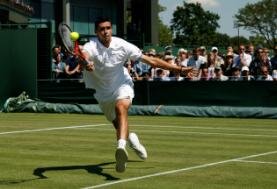 very high percentage of first serves, and I didn’t return as well as I would have liked, but I was happy with the way that I served throughout.” Murray is already the centre of considerable attention after a superb 12 months that has seen him rise to number three in the world and made him a serious contender to end the 73-year wait since Fred Perry last lifted the men’s singles trophy for Britain. In 2009, Victor Hanescu prevailed a dramatic 5-set first round in Melbourne, in Paris he won an all-tie-break 3-setter in round 1, at Wimbledon he won again a marathon 5-set encounter eliminating Ivan Navarro 6-3, 6-7(5), 6-4, 6-7(5), 12-10. The Romanian player saved four match points at *6:7 including a double m.p. then broke the Spaniard at 9-all. Navarro broke back (his only break in the match!), but suffered cramps and lost the last two games of the 4-hour 11-minute battle.
very high percentage of first serves, and I didn’t return as well as I would have liked, but I was happy with the way that I served throughout.” Murray is already the centre of considerable attention after a superb 12 months that has seen him rise to number three in the world and made him a serious contender to end the 73-year wait since Fred Perry last lifted the men’s singles trophy for Britain. In 2009, Victor Hanescu prevailed a dramatic 5-set first round in Melbourne, in Paris he won an all-tie-break 3-setter in round 1, at Wimbledon he won again a marathon 5-set encounter eliminating Ivan Navarro 6-3, 6-7(5), 6-4, 6-7(5), 12-10. The Romanian player saved four match points at *6:7 including a double m.p. then broke the Spaniard at 9-all. Navarro broke back (his only break in the match!), but suffered cramps and lost the last two games of the 4-hour 11-minute battle.
Second round: Ian Chadband
Lleyton Hewitt appeared to be hailed here like some cuddly elder statesman after defying the years and riding on all the sympathy votes to give Juan Martin del Potro, one of the bright young things of world tennis, a lesson in grass court tennis. They used to 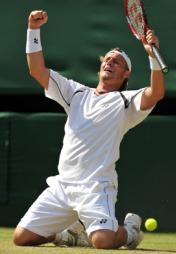 hate all the fist pumps and the manic cries of “C’maaawn” that Hewitt would direct at himself but on Thursday every one was cheered to the still unclosed roof. Heck, they were actually prepared to echo the support offered by a small bunch of Hewitt’s vociferous yellow-clad compatriots even though they might have had a lot more fun celebrating the end of Australia’s one-man challenge in this tournament. And when Hewitt fell to his knees following his 6-3, 7-5, 7-5 triumph over the fifth seed, seemingly close to tears after pulling off the first major shock of the men’s event, he was given an ovation which actually felt more resounding than the one he received after defeating David Nalbandian in the 2002 final. That triumph is now seen as the ‘interregnum’ final, the one sandwiched after the Sampras era and before six years of Federer and Nadal domination… Ball girl Erin Lorencin, 15, was kneeling at the net next to the umpire when she found herself crushed under the weight of Frenchman Michael Llodra. He landed squarely on top of her as he failed to come to a halt after running across the court to return a drop shot during his match against German Tommy Haas. Llodra managed to fall over, squashing Erin against the umpire’s chair, before knocking a chair over and sending a bin flying. Blonde Erin, who studies at Graveney School in south London, was flattened and as Llodra picked himself up from the floor, he came to the aide of the youngster. Llodra injured himself in that situation and retired having played just seven games against Haas… Almost 200 minutes into one of those Wimbledon matches that meander toward darkness and feature raucous patrons who just might have had, you know, a sip, the Thousand Oaks tower prepared to serve at 4:5 in a 5th set. Sam Querrey walked along behind the baseline holding tennis balls while the Centre Court fans finished doing the globally deathless scourge known as “The Wave,” their joy swelling when some dignitaries in the Royal Box joined in. Once they hushed, the 21-year-old from Southern California tried to hang in at 8:46 p.m. in only the second fifth set of his lifetime. Five points later, it would become another lesson in the patchy development of the 6-foot-6 Querrey, ranked No. 47. He would answer a fine approach shot with one last backhand long, and No. 13 Marin Cilic would fall to his knees after his 4-6, 7-6(3), 6-3, 6-7(4), 6-4 win, and Querrey (led 5:2* in the 2nd set) would walk to the net with the
hate all the fist pumps and the manic cries of “C’maaawn” that Hewitt would direct at himself but on Thursday every one was cheered to the still unclosed roof. Heck, they were actually prepared to echo the support offered by a small bunch of Hewitt’s vociferous yellow-clad compatriots even though they might have had a lot more fun celebrating the end of Australia’s one-man challenge in this tournament. And when Hewitt fell to his knees following his 6-3, 7-5, 7-5 triumph over the fifth seed, seemingly close to tears after pulling off the first major shock of the men’s event, he was given an ovation which actually felt more resounding than the one he received after defeating David Nalbandian in the 2002 final. That triumph is now seen as the ‘interregnum’ final, the one sandwiched after the Sampras era and before six years of Federer and Nadal domination… Ball girl Erin Lorencin, 15, was kneeling at the net next to the umpire when she found herself crushed under the weight of Frenchman Michael Llodra. He landed squarely on top of her as he failed to come to a halt after running across the court to return a drop shot during his match against German Tommy Haas. Llodra managed to fall over, squashing Erin against the umpire’s chair, before knocking a chair over and sending a bin flying. Blonde Erin, who studies at Graveney School in south London, was flattened and as Llodra picked himself up from the floor, he came to the aide of the youngster. Llodra injured himself in that situation and retired having played just seven games against Haas… Almost 200 minutes into one of those Wimbledon matches that meander toward darkness and feature raucous patrons who just might have had, you know, a sip, the Thousand Oaks tower prepared to serve at 4:5 in a 5th set. Sam Querrey walked along behind the baseline holding tennis balls while the Centre Court fans finished doing the globally deathless scourge known as “The Wave,” their joy swelling when some dignitaries in the Royal Box joined in. Once they hushed, the 21-year-old from Southern California tried to hang in at 8:46 p.m. in only the second fifth set of his lifetime. Five points later, it would become another lesson in the patchy development of the 6-foot-6 Querrey, ranked No. 47. He would answer a fine approach shot with one last backhand long, and No. 13 Marin Cilic would fall to his knees after his 4-6, 7-6(3), 6-3, 6-7(4), 6-4 win, and Querrey (led 5:2* in the 2nd set) would walk to the net with the 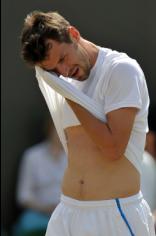 mournful steps of a zombie. “I was bummed,” he said. “I wanted that one.” Still, the late bloomer with the normal childhood made it to his first Wimbledon second round on his third Wimbledon try, during which he gathered some wisdom for the next such challenge as the U.S. tries to construct a stout new generation. He had felt privileged. “It’s great when the crowd gets rowdy,” he said at dusk of another frenetic day at Wimbledon. “I think tennis would become more popular if people were just drunk all the time.” Then he added soberly, “I had a great time. Not many people get a chance to play on Centre Court at Wimbledon.” There were two tie-breaks also in other 5-set duel, between two Germans as Philipp Petzschner defeated Mischa Zverev 4-6, 7-6(13), 3-6, 7-6(5), 6-0 in 3 hours 36 minutes. Petzschner saved four set points in the 2nd set tie-break (all serving): 5:6, 7:8, 9:10 & 11:12, then rallied from a 2:5 deficit in the 4th set tie-break winning twelve points in a row in total). “I’m very proud to be the first time in the third round of a Grand Slam tournament,” said Petzschner. World number two Roger Federer set down an ominous marker for his opponents at Wimbledon by easing to a 6-2, 6-2, 6-4 straight sets victory against Spain’s Guillermo Garcia-Lopez. The result achieved on Centre Court took the Swiss’ career tally to 35 straight-sets win recorded at the All England Club, a Grand Slam he has won five times. The 42-in-the-world Garcia-Lopez was thrashed within 90 minutes in a demonstration of strength by the unflustered former champion. The 27-year-old Federer broke twice in the first and second sets before winning against serve in game four of the third to eventually take the match and set up a third-round clash with Germany’s Phillip Kohlschreiber. The German was made to work hard to get past Czech Ivo Minar, eventually coming out on top 6-4, 3-6, 4-6, 6-2, 8-6 after a grueling five set test. Elsewhere, Novak Djokovic stayed on course to meet Federer in the semifinals stage dispatching German qualifier Simon Greul 7-5, 6-1, 6-4. Greul, 28, who had never won a single match on grass before last week’s qualifying for Wimbledon played some attacking tennis but was eventually overcome
mournful steps of a zombie. “I was bummed,” he said. “I wanted that one.” Still, the late bloomer with the normal childhood made it to his first Wimbledon second round on his third Wimbledon try, during which he gathered some wisdom for the next such challenge as the U.S. tries to construct a stout new generation. He had felt privileged. “It’s great when the crowd gets rowdy,” he said at dusk of another frenetic day at Wimbledon. “I think tennis would become more popular if people were just drunk all the time.” Then he added soberly, “I had a great time. Not many people get a chance to play on Centre Court at Wimbledon.” There were two tie-breaks also in other 5-set duel, between two Germans as Philipp Petzschner defeated Mischa Zverev 4-6, 7-6(13), 3-6, 7-6(5), 6-0 in 3 hours 36 minutes. Petzschner saved four set points in the 2nd set tie-break (all serving): 5:6, 7:8, 9:10 & 11:12, then rallied from a 2:5 deficit in the 4th set tie-break winning twelve points in a row in total). “I’m very proud to be the first time in the third round of a Grand Slam tournament,” said Petzschner. World number two Roger Federer set down an ominous marker for his opponents at Wimbledon by easing to a 6-2, 6-2, 6-4 straight sets victory against Spain’s Guillermo Garcia-Lopez. The result achieved on Centre Court took the Swiss’ career tally to 35 straight-sets win recorded at the All England Club, a Grand Slam he has won five times. The 42-in-the-world Garcia-Lopez was thrashed within 90 minutes in a demonstration of strength by the unflustered former champion. The 27-year-old Federer broke twice in the first and second sets before winning against serve in game four of the third to eventually take the match and set up a third-round clash with Germany’s Phillip Kohlschreiber. The German was made to work hard to get past Czech Ivo Minar, eventually coming out on top 6-4, 3-6, 4-6, 6-2, 8-6 after a grueling five set test. Elsewhere, Novak Djokovic stayed on course to meet Federer in the semifinals stage dispatching German qualifier Simon Greul 7-5, 6-1, 6-4. Greul, 28, who had never won a single match on grass before last week’s qualifying for Wimbledon played some attacking tennis but was eventually overcome 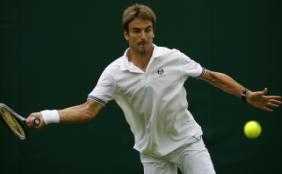 by the class of the big-serving Serb. The fourth seed will go on to face American Mardy Fish who defeated Janko Tipsarevic 6-4, 3-6, 6-1, 6-4 in his second-round tie. Other results from the third day’s play at the London-based tournament saw Israel’s Dudi Sela triumph over Germany’s Rainer Schuettler 7-6(3), 6-3, 6-2. while nine seed Jo-Wilfried Tsonga of France was handed a bye to the last 32 of the competition when Simone Bolelli pulled out with a back injury. Spain’s Tommy Robredo, seeded 15 for the event knocked out Stefan Koubek of Austria with a 3-6, 4-6, 6-4, 7-6(5), 6-1 win (3:30). Amazingly, it was Robredo’s 17th tie-break won in a row! 32-year-old Koubek lost a dramatic five-setter at Wimbledon for the fourth time (previously to Schalken, Ferrero & Udomchoke). Other Spanish player – Fernando Verdasco progressed at the expense of Belgium’s Kristof Vliegen. The win proved harder than the headline suggests with three of the four sets going to a tie-break – 7-6(3), 6-7(3), 7-6(4), 6-4 under three hours. Verdasco avenged three defeats to Vliegen, but two of them came from lower levels of men’s tennis (Futures ’02 & Challenger ’03). The Spaniard served 20 aces and never faced a break point, yet he trailed 1:4 in the 3rd set tie-break. “I’m not surprised (how tough it was). He’s a very good player,” said Verdasco. “He’s so talented, and when he plays well, he’s so tough to beat.” Sweden’s 13th seed Robin Soderling had to come back from a set down and 4:6 in the 2nd set tie-break to finally see off Spain’s Marcel Granollers 4-6, 7-6(7), 6-4, 7-5.
by the class of the big-serving Serb. The fourth seed will go on to face American Mardy Fish who defeated Janko Tipsarevic 6-4, 3-6, 6-1, 6-4 in his second-round tie. Other results from the third day’s play at the London-based tournament saw Israel’s Dudi Sela triumph over Germany’s Rainer Schuettler 7-6(3), 6-3, 6-2. while nine seed Jo-Wilfried Tsonga of France was handed a bye to the last 32 of the competition when Simone Bolelli pulled out with a back injury. Spain’s Tommy Robredo, seeded 15 for the event knocked out Stefan Koubek of Austria with a 3-6, 4-6, 6-4, 7-6(5), 6-1 win (3:30). Amazingly, it was Robredo’s 17th tie-break won in a row! 32-year-old Koubek lost a dramatic five-setter at Wimbledon for the fourth time (previously to Schalken, Ferrero & Udomchoke). Other Spanish player – Fernando Verdasco progressed at the expense of Belgium’s Kristof Vliegen. The win proved harder than the headline suggests with three of the four sets going to a tie-break – 7-6(3), 6-7(3), 7-6(4), 6-4 under three hours. Verdasco avenged three defeats to Vliegen, but two of them came from lower levels of men’s tennis (Futures ’02 & Challenger ’03). The Spaniard served 20 aces and never faced a break point, yet he trailed 1:4 in the 3rd set tie-break. “I’m not surprised (how tough it was). He’s a very good player,” said Verdasco. “He’s so talented, and when he plays well, he’s so tough to beat.” Sweden’s 13th seed Robin Soderling had to come back from a set down and 4:6 in the 2nd set tie-break to finally see off Spain’s Marcel Granollers 4-6, 7-6(7), 6-4, 7-5.
Third round: (ESPN)
Radek Stepanek was two games away (4-all) from losing to David Ferrer a 5-set match for the third time in career, but won those two games and the match 7-5, 7-5, 3-6, 4-6, 6-4 in 3 hours 44 minutes. The Czech played the last three games with a slightly injured knee, and said afterwards: “Today at 5:5 in the 2nd set when I had a breakpoint, David served a double-fault,  and I was just hitting the ball back. When I hit the ball, I felt in the knee something is wrong. But I went to the chair, came back to serve, and already the first serve, my knee didn’t respond with me, just broke down. When I tried to serve at 15-all, I couldn’t even stand on the leg, so I had to stop and call the physio. It happened to me already I think twice, so I knew where the problem is.” Andy Roddick advanced to the fourth round at Wimbledon by defeating Jurgen Melzer, 7-6(2), 7-6(2), 4-6, 6-3. Melzer is eliminated in the third round in six consecutive Grand Slams. Roddick had 33 aces Saturday, the final one on match point. He improved to 9-0 against Melzer, and he’s 22-3 this year in tie-breakers! How does his play in years 2004-05 when reached Wimbledon finals compare with this week? “I think the best I’ve played here was probably ’04,” Roddick said. “But as far as comparing to ’05, it’s probably similar.” His next opponent will be No. 20 Tomas Berdych, who eliminated No. 12 Nikolay Davydenko 6-2, 6-3, 6-2 avenging 8 consecutive defeats to the Russian. Berdych has yet to drop a set through three matches, and he’s 2-2 against Roddick, winning the last time they played – at Tokyo in October. “Berdych is streaky,” Roddick said. “It’s rarely middle-of-the-road. He’s either really good or not so good. Right now you expect to get the best of him, with the way he has been rolling through the tournament so far.” Meanwhile, Andy Murray completed another comfortable win, this time against Viktor Troicki 6-2, 6-3, 6-4. Murray saved the only break point he faced in the match and hit 37 winners, sealing the win with an ace. Troicki offered a little more resistance in an entertaining 3rd set but Murray was never troubled as he moved through. “I’m very happy I won the three matches this week,” said Murray. “I hope that I can keep it going next week because my performances were pretty solid.” Germany’s Tommy Haas, whose match against Marin Cilic was suspended Friday night because of darkness at 6-all in the final set, toiled in the sun for another six games before completing a 7-5, 7-5, 1-6, 6-7(3), 10-8 win. “It has never happened to me that we stopped playing at six-all in the fifth,” Haas said. “We should have a tie-break at six-all like in the U.S. Open. When you’ve played so much tennis… it’s really draining.” Haas had two match points in the 4th set at 5:4*, and saved two match points at *5:6 in the 5th; after the resumption Haas broke Cilic at 8:8 and saved two break points serving for the match. Cilic had two set points on serve at 5:3 in the 1st set, he also led 5:4 in the 2nd and *5:3 in the 5th set! No. 29 Igor Andreev also was stranded Friday night, and had to return Saturday morning to finish off Andreas Seppi 6-1, 7-6(5), 4-6, 7-6(5). American Jesse Levine‘s best run at a major event came to an end. The last qualifier in the men’s draw, Levine faced 23 break points and lost to Stanislas Wawrinka 5-7, 7-5, 6-3, 6-3 Unseeded Lleyton Hewitt, the 2002 champion,
and I was just hitting the ball back. When I hit the ball, I felt in the knee something is wrong. But I went to the chair, came back to serve, and already the first serve, my knee didn’t respond with me, just broke down. When I tried to serve at 15-all, I couldn’t even stand on the leg, so I had to stop and call the physio. It happened to me already I think twice, so I knew where the problem is.” Andy Roddick advanced to the fourth round at Wimbledon by defeating Jurgen Melzer, 7-6(2), 7-6(2), 4-6, 6-3. Melzer is eliminated in the third round in six consecutive Grand Slams. Roddick had 33 aces Saturday, the final one on match point. He improved to 9-0 against Melzer, and he’s 22-3 this year in tie-breakers! How does his play in years 2004-05 when reached Wimbledon finals compare with this week? “I think the best I’ve played here was probably ’04,” Roddick said. “But as far as comparing to ’05, it’s probably similar.” His next opponent will be No. 20 Tomas Berdych, who eliminated No. 12 Nikolay Davydenko 6-2, 6-3, 6-2 avenging 8 consecutive defeats to the Russian. Berdych has yet to drop a set through three matches, and he’s 2-2 against Roddick, winning the last time they played – at Tokyo in October. “Berdych is streaky,” Roddick said. “It’s rarely middle-of-the-road. He’s either really good or not so good. Right now you expect to get the best of him, with the way he has been rolling through the tournament so far.” Meanwhile, Andy Murray completed another comfortable win, this time against Viktor Troicki 6-2, 6-3, 6-4. Murray saved the only break point he faced in the match and hit 37 winners, sealing the win with an ace. Troicki offered a little more resistance in an entertaining 3rd set but Murray was never troubled as he moved through. “I’m very happy I won the three matches this week,” said Murray. “I hope that I can keep it going next week because my performances were pretty solid.” Germany’s Tommy Haas, whose match against Marin Cilic was suspended Friday night because of darkness at 6-all in the final set, toiled in the sun for another six games before completing a 7-5, 7-5, 1-6, 6-7(3), 10-8 win. “It has never happened to me that we stopped playing at six-all in the fifth,” Haas said. “We should have a tie-break at six-all like in the U.S. Open. When you’ve played so much tennis… it’s really draining.” Haas had two match points in the 4th set at 5:4*, and saved two match points at *5:6 in the 5th; after the resumption Haas broke Cilic at 8:8 and saved two break points serving for the match. Cilic had two set points on serve at 5:3 in the 1st set, he also led 5:4 in the 2nd and *5:3 in the 5th set! No. 29 Igor Andreev also was stranded Friday night, and had to return Saturday morning to finish off Andreas Seppi 6-1, 7-6(5), 4-6, 7-6(5). American Jesse Levine‘s best run at a major event came to an end. The last qualifier in the men’s draw, Levine faced 23 break points and lost to Stanislas Wawrinka 5-7, 7-5, 6-3, 6-3 Unseeded Lleyton Hewitt, the 2002 champion, 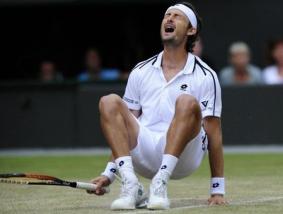 reached the fourth round for the sixth year in a row by beating Philipp Petzschner 7-5, 7-6(3), 6-3. With some amusing chants ringing in his ears, including adapted versions of popular songs by the Beatles, Gary Glitter and Frankie Valli, Hewitt broke Petzschner’s resolve in the third set and clinched the win on his third match point. Juan Carlos Ferrero also advanced. Ferrero, a former No. 1 now ranked 70th, needed a wild-card invitation to get into the field, but he beat No. 10 Fernando Gonzalez 4-6, 7-5, 6-4, 4-6, 6-4 on Court 1 as a light rain fell. There was some consideration given to moving the conclusion of that match to Centre Court, where the new retractable roof was closed, just in case. But Ferrero and Gonzalez finished, and the roof has yet to be used as a barrier against wet weather. With the 10th seed serving to stay in the match, Ferrero forced a match point and then clinched a stunning victory when Gonzalez pushed a second serve long. Ferrero was delighted with his performance and not surprised to be in the second week for the fourth time. “No, not at all,” he said. ‘It’s not my first time and I’ve been playing very well. I had the week at Queen’s then I spent the week practicing at home. I was ready to be here and physically I’m 100% okay.” Ivo Karlovic, the giant Croat, and ninth seed Jo-Wilfried Tsonga turned back the clock to the mid-1990s with an ace-fuelled, hard-hitting encounter. The bare statistics are that Karlovic out-aced Tsonga 46 aces to 26, won 90 per cent to 87 per cent of first service points, but that doesn’t do justice to Karlovic, who demonstrated that he can be a threat to anyone this year with his aggressive and often superb serve-volley game. Karlovic recorded a 7-6(5), 6-7(5), 7-5, 7-6(5) win in 2 hours and 44 minutes to take his place in the Wimbledon fourth round for the first time since 2004 – which equals his best Grand Slam championship performance. “What I can say?” said Tsonga. “He served well, and that’s it.” Karlovic has now hit 102 aces in three matches and has not dropped serve. “If I can win with only one shot, I’m, I don’t know, a genius,” smiled Karlovic. Dudi Sela
reached the fourth round for the sixth year in a row by beating Philipp Petzschner 7-5, 7-6(3), 6-3. With some amusing chants ringing in his ears, including adapted versions of popular songs by the Beatles, Gary Glitter and Frankie Valli, Hewitt broke Petzschner’s resolve in the third set and clinched the win on his third match point. Juan Carlos Ferrero also advanced. Ferrero, a former No. 1 now ranked 70th, needed a wild-card invitation to get into the field, but he beat No. 10 Fernando Gonzalez 4-6, 7-5, 6-4, 4-6, 6-4 on Court 1 as a light rain fell. There was some consideration given to moving the conclusion of that match to Centre Court, where the new retractable roof was closed, just in case. But Ferrero and Gonzalez finished, and the roof has yet to be used as a barrier against wet weather. With the 10th seed serving to stay in the match, Ferrero forced a match point and then clinched a stunning victory when Gonzalez pushed a second serve long. Ferrero was delighted with his performance and not surprised to be in the second week for the fourth time. “No, not at all,” he said. ‘It’s not my first time and I’ve been playing very well. I had the week at Queen’s then I spent the week practicing at home. I was ready to be here and physically I’m 100% okay.” Ivo Karlovic, the giant Croat, and ninth seed Jo-Wilfried Tsonga turned back the clock to the mid-1990s with an ace-fuelled, hard-hitting encounter. The bare statistics are that Karlovic out-aced Tsonga 46 aces to 26, won 90 per cent to 87 per cent of first service points, but that doesn’t do justice to Karlovic, who demonstrated that he can be a threat to anyone this year with his aggressive and often superb serve-volley game. Karlovic recorded a 7-6(5), 6-7(5), 7-5, 7-6(5) win in 2 hours and 44 minutes to take his place in the Wimbledon fourth round for the first time since 2004 – which equals his best Grand Slam championship performance. “What I can say?” said Tsonga. “He served well, and that’s it.” Karlovic has now hit 102 aces in three matches and has not dropped serve. “If I can win with only one shot, I’m, I don’t know, a genius,” smiled Karlovic. Dudi Sela 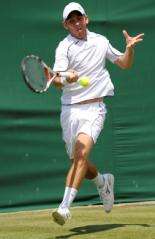 became the first Israeli man in 20 years to reach the fourth round at Wimbledon. Sela threw his racket in anger after going down a break in the 4th set but rallied to beat Tommy Robredo 7-6(8), 7-5, 2-6, 7-5. Sela prevented Robredo equaling Roddick’s record of most tie-breaks won in a row. The Spaniard was very close to do that, but blew three set points in the tie-break. He was also serving to win the 4th set at 5:4 when lost three straight games. Sela became just the fourth Israeli man to reach the round of 16 in a Grand Slam tournament and the first since Amos Mansdorf at the 1992 Australian Open. Mansdorf also accomplished the feat at Wimbledon in 1989. “In Israel, we have only hard courts, so I was expecting more to do better… on the hard courts than on grass or clay,” Sela said. “But any Grand Slam fourth round, it’s good, I think.” When Roger Federer misfired on an important shot Friday, his knees buckled and he stomped behind the baseline, miffed at his mere mortality. The moment quickly passed, and Federer advanced to the second week at Wimbledon by defeating Philipp Kohlschreiber 6-3, 6-2, 6-7(5), 6-1. Federer could have won more quickly. He converted only 7 of 22 break-point chances and led 4:2 in the 3rd set before the No. 32-ranked German played his best stretch of tennis. Federer’s rare display of frustration came after he pulled an easy forehand wide trailing 4:5 in the tie-break. Two points later, Kohlschreiber ripped a backhand winner to force a 4th set, but Federer pulled away from there and extended his winning streak to 15 matches, his longest in two years. “Sure, I would have loved to win in straight sets, but he came back strong,” Federer said. “I was happy how I reacted. I didn’t panic.” Robin Soderling saved a set point in the 1st set tie-break reached the fourth round for the first time by defeating Nicolas Almagro 7-6(7), 6-4, 6-4. Soderling lost only three points on his first serve and never faced a break point serving 19 aces (Almagro hit 20).
became the first Israeli man in 20 years to reach the fourth round at Wimbledon. Sela threw his racket in anger after going down a break in the 4th set but rallied to beat Tommy Robredo 7-6(8), 7-5, 2-6, 7-5. Sela prevented Robredo equaling Roddick’s record of most tie-breaks won in a row. The Spaniard was very close to do that, but blew three set points in the tie-break. He was also serving to win the 4th set at 5:4 when lost three straight games. Sela became just the fourth Israeli man to reach the round of 16 in a Grand Slam tournament and the first since Amos Mansdorf at the 1992 Australian Open. Mansdorf also accomplished the feat at Wimbledon in 1989. “In Israel, we have only hard courts, so I was expecting more to do better… on the hard courts than on grass or clay,” Sela said. “But any Grand Slam fourth round, it’s good, I think.” When Roger Federer misfired on an important shot Friday, his knees buckled and he stomped behind the baseline, miffed at his mere mortality. The moment quickly passed, and Federer advanced to the second week at Wimbledon by defeating Philipp Kohlschreiber 6-3, 6-2, 6-7(5), 6-1. Federer could have won more quickly. He converted only 7 of 22 break-point chances and led 4:2 in the 3rd set before the No. 32-ranked German played his best stretch of tennis. Federer’s rare display of frustration came after he pulled an easy forehand wide trailing 4:5 in the tie-break. Two points later, Kohlschreiber ripped a backhand winner to force a 4th set, but Federer pulled away from there and extended his winning streak to 15 matches, his longest in two years. “Sure, I would have loved to win in straight sets, but he came back strong,” Federer said. “I was happy how I reacted. I didn’t panic.” Robin Soderling saved a set point in the 1st set tie-break reached the fourth round for the first time by defeating Nicolas Almagro 7-6(7), 6-4, 6-4. Soderling lost only three points on his first serve and never faced a break point serving 19 aces (Almagro hit 20).
Fourth round: (BBC)
Andy Roddick blitzed Tomas Berdych with a magnificent display of power serving to win 7-6(5), 6-4, 6-3. The first set was nip and tuck all the way with both players holding their serves well. Berdych was playing some impressive tennis. The American number six seed initially struggled to impose his 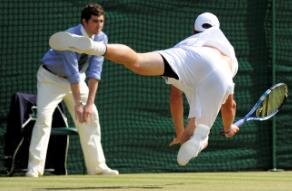 own game on the contest and as a result Berdych had little trouble in maintaining his own serve. A deft angled volley gave Berdych a 5:4 lead in the opening set but Roddick held his own serve to push the contest towards a tie-break. A double-fault from Berdych allowed Roddick to take an early 3:0 lead, and the American kept his cool to take the set with two stunning aces. The 2nd set began with serve again dominant. Roddick was delivering some superb aces – 16 overall to go 4:3 ahead. But Berdych was also comfortable on his own service game and, allied to Roddick’s propensity for over-hitting his returns, the score quickly went back level at 4-all. Roddick regained the lead and with just five unforced errors against his name he looked to be in command. He underlined his superiority when he forced Berdych to over-hit a return to give the American a two-set points. He put a two-handed backhand wide into the tram-lines but made no mistake with the second opportunity. A glorious cross-court forehand volley was returned into the net by Berdych to give Roddick the set. A-Rod engineered three break points in the 6th game of the 3rd set and, while he squandered one with an over-hit return, he broke the Czech’s serve to go 4:2 up and put himself on course for victory. Lleyton Hewitt staged a classic comeback from two sets down to defeat Radek Stepanek. Hewitt defeated the Czech in a rain interrupted match 4-6, 2-6, 6-1, 6-2, 6-2 in 2 hours and 54 minutes. Apart from some tape on his left knee, Stepanek showed no early signs of the injury that struck during his third-round match against Ferrer on Saturday and which prompted him to fly his doctor in from Prague. Hewitt [56] opened with a double fault but recovered to hold serve before being broken two games later which initiated Stepanek’s advantage. Hewitt took a medical time out for treatment to his left thigh in the 2nd set at 1:4* and the subsequent games went on serve for Stepanek to go two sets up. Hewitt launched his fightback as the rain, which had given SW19 a wide berth through the first week, began to fall. He took a 4:0 lead in the 3rd set just as the shower became heavier and the covers came out. The 45-minute delay did nothing to unhinge Hewitt’s comeback and the Australian converted his second set point when Stepanek sent a forehand long. Hewitt replied to a Stepanek smash with a brilliant backhand to set up two break points at the start of the 4th set. After converting the first he never looked like failing to force the decider. Stepanek took a medical time out for his knee, which delayed the inevitable and Hewitt served out the set. Hewitt signaled his intentions with a break in the 1st game of the decider and the former world No. 1 was untroubled, earning the right to serve for the match with another in the seventh game before sealing victory on his second match point when Stepanek missed a backhand. “It’s always tough. I just had to dig deep and try to find something and not look too far ahead,” said Hewitt. Andy Murray kept his campaign on track with a dramatic late-night win over Stanislas Wawrinka as
own game on the contest and as a result Berdych had little trouble in maintaining his own serve. A deft angled volley gave Berdych a 5:4 lead in the opening set but Roddick held his own serve to push the contest towards a tie-break. A double-fault from Berdych allowed Roddick to take an early 3:0 lead, and the American kept his cool to take the set with two stunning aces. The 2nd set began with serve again dominant. Roddick was delivering some superb aces – 16 overall to go 4:3 ahead. But Berdych was also comfortable on his own service game and, allied to Roddick’s propensity for over-hitting his returns, the score quickly went back level at 4-all. Roddick regained the lead and with just five unforced errors against his name he looked to be in command. He underlined his superiority when he forced Berdych to over-hit a return to give the American a two-set points. He put a two-handed backhand wide into the tram-lines but made no mistake with the second opportunity. A glorious cross-court forehand volley was returned into the net by Berdych to give Roddick the set. A-Rod engineered three break points in the 6th game of the 3rd set and, while he squandered one with an over-hit return, he broke the Czech’s serve to go 4:2 up and put himself on course for victory. Lleyton Hewitt staged a classic comeback from two sets down to defeat Radek Stepanek. Hewitt defeated the Czech in a rain interrupted match 4-6, 2-6, 6-1, 6-2, 6-2 in 2 hours and 54 minutes. Apart from some tape on his left knee, Stepanek showed no early signs of the injury that struck during his third-round match against Ferrer on Saturday and which prompted him to fly his doctor in from Prague. Hewitt [56] opened with a double fault but recovered to hold serve before being broken two games later which initiated Stepanek’s advantage. Hewitt took a medical time out for treatment to his left thigh in the 2nd set at 1:4* and the subsequent games went on serve for Stepanek to go two sets up. Hewitt launched his fightback as the rain, which had given SW19 a wide berth through the first week, began to fall. He took a 4:0 lead in the 3rd set just as the shower became heavier and the covers came out. The 45-minute delay did nothing to unhinge Hewitt’s comeback and the Australian converted his second set point when Stepanek sent a forehand long. Hewitt replied to a Stepanek smash with a brilliant backhand to set up two break points at the start of the 4th set. After converting the first he never looked like failing to force the decider. Stepanek took a medical time out for his knee, which delayed the inevitable and Hewitt served out the set. Hewitt signaled his intentions with a break in the 1st game of the decider and the former world No. 1 was untroubled, earning the right to serve for the match with another in the seventh game before sealing victory on his second match point when Stepanek missed a backhand. “It’s always tough. I just had to dig deep and try to find something and not look too far ahead,” said Hewitt. Andy Murray kept his campaign on track with a dramatic late-night win over Stanislas Wawrinka as  Wimbledon witnessed its first floodlit match. The fourth-round contest was played under the new roof after a rain shower. And the Scot battled to a 2-6, 6-3, 6-3, 5-7, 6-3 win in 3 hours 56 minutes, with the end coming at 22:38 – the latest Wimbledon finish. “It was pretty special, I thought Stan played a great match,” Murray told BBC Sport. “The standard he set at the start was tough to keep up with.” With the light fading outside as the time approached 21:00, there was no danger of the match ending early as the new floodlights ensured play would go on for as long as necessary. It was Murray who faltered first in the 4th set, a poor forehand giving Wawrinka 30/40 at 3-all, but the Swiss sent a forehand long. With the floodlit contest now effectively a night-match, like those seen at the US and Australian Opens, Murray had a mini-match point at 4:3 to serve for the match but netted a forehand and Wawrinka kept the contest alive. The Swiss then let a chance slip in game nine but finally made the breakthrough on his 13th break point of the match to lead 6:5, and he served out with an ace to force a decider at 21:53. Murray grabbed the initiative in game two of the final set when Wawrinka netted a volley but the Swiss came storming back with three straight games to level at 3:3. Outside Centre Court, thousands of fans remained glued to the action on the big screen despite the total darkness, and their man urged those inside the 15,000-seater arena to give greater support in a dramatic 8th game. The world number three netted on two break points before he set up a forehand on the third and cracked it down the line to a huge roar from the crowd, and Murray then
Wimbledon witnessed its first floodlit match. The fourth-round contest was played under the new roof after a rain shower. And the Scot battled to a 2-6, 6-3, 6-3, 5-7, 6-3 win in 3 hours 56 minutes, with the end coming at 22:38 – the latest Wimbledon finish. “It was pretty special, I thought Stan played a great match,” Murray told BBC Sport. “The standard he set at the start was tough to keep up with.” With the light fading outside as the time approached 21:00, there was no danger of the match ending early as the new floodlights ensured play would go on for as long as necessary. It was Murray who faltered first in the 4th set, a poor forehand giving Wawrinka 30/40 at 3-all, but the Swiss sent a forehand long. With the floodlit contest now effectively a night-match, like those seen at the US and Australian Opens, Murray had a mini-match point at 4:3 to serve for the match but netted a forehand and Wawrinka kept the contest alive. The Swiss then let a chance slip in game nine but finally made the breakthrough on his 13th break point of the match to lead 6:5, and he served out with an ace to force a decider at 21:53. Murray grabbed the initiative in game two of the final set when Wawrinka netted a volley but the Swiss came storming back with three straight games to level at 3:3. Outside Centre Court, thousands of fans remained glued to the action on the big screen despite the total darkness, and their man urged those inside the 15,000-seater arena to give greater support in a dramatic 8th game. The world number three netted on two break points before he set up a forehand on the third and cracked it down the line to a huge roar from the crowd, and Murray then 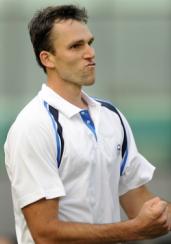 threw in a stunning drop shot before surviving a tense Hawkeye challenge on his way to serving out an extraordinary victory. “I’ll have a pretty deep sleep tonight after that,” said Murray. “After a match like that you take a lot of confidence, it was a great day.” No. 22 Ivo Karlovic hit 35 aces and beat No. 7 Fernando Verdasco 7-6(5), 6-7(4), 6-3, 7-6(9). Karlovic held 23 games not even facing a break point and managed to break Wayne Arthurs‘ record for the most service games won in a row which was 109 or 111 depending how to count. Novak Djokovic broke seven times and beat Dudi Sela 6-2, 6-4, 6-1. Roger Federer advanced to the quarterfinals, hitting 23 aces, never losing serve and beating familiar foil Robin Soderling 6-4, 7-6(5), 7-6(5). Federer improved to 11-0 against Soderling. This time the No. 2-seeded Federer came through on a handful of key points. He earned the only service break of the match in the 9th game of the opening set, when Soderling committed five unforced errors. “Today was hard to get through a really dangerous match,” Federer said. “Not many rallies, so maybe not as much fun for the people. But I stayed calm, waited for my chance.” Soderling had only two break-point chances against Federer – both at 4-all in the 3rd set – and failed to put either return in play. Federer lost just eight points on his first serve and committed only eight unforced errors in the match.
threw in a stunning drop shot before surviving a tense Hawkeye challenge on his way to serving out an extraordinary victory. “I’ll have a pretty deep sleep tonight after that,” said Murray. “After a match like that you take a lot of confidence, it was a great day.” No. 22 Ivo Karlovic hit 35 aces and beat No. 7 Fernando Verdasco 7-6(5), 6-7(4), 6-3, 7-6(9). Karlovic held 23 games not even facing a break point and managed to break Wayne Arthurs‘ record for the most service games won in a row which was 109 or 111 depending how to count. Novak Djokovic broke seven times and beat Dudi Sela 6-2, 6-4, 6-1. Roger Federer advanced to the quarterfinals, hitting 23 aces, never losing serve and beating familiar foil Robin Soderling 6-4, 7-6(5), 7-6(5). Federer improved to 11-0 against Soderling. This time the No. 2-seeded Federer came through on a handful of key points. He earned the only service break of the match in the 9th game of the opening set, when Soderling committed five unforced errors. “Today was hard to get through a really dangerous match,” Federer said. “Not many rallies, so maybe not as much fun for the people. But I stayed calm, waited for my chance.” Soderling had only two break-point chances against Federer – both at 4-all in the 3rd set – and failed to put either return in play. Federer lost just eight points on his first serve and committed only eight unforced errors in the match.
Quarterfinals: (Sportsmail)
Same Lleyton Hewitt but, this time, a heartbreakingly different result. Battling a thigh injury and under constant fire from American Andy Roddick‘s 43 ace bombardment, Hewitt somehow forced his Wimbledon quarter-final into a fifth set only to fall agonizingly short of a victory that would have occupied a deserved place among his many epics. Instead, it was Roddick who prevailed in a gripping arm-wrestle, breaking Hewitt late in the final set before serving out a 6-3, 6-7(10), 7-6(1), 4-6, 6-4 victory in a match that see-sawed throughout the 3 hours and 50 minutes it took to complete. Twice, Hewitt fought back tenaciously from seemingly hopeless 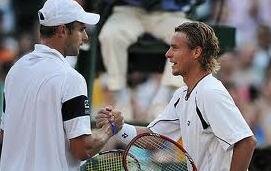 situations to stay in the match. After losing the 1st set, he saved three set points in a tumultuous 2nd set-tie break and then, after surrendering meekly in the 3rd set tie-break and immediately dropping his serve in the 4th set, Hewitt somehow clawed back again to take Roddick the full distance. Throughout a nail-biting 5th set, the Australian had his chances. With Roddick serving at 1:2 in the final set, three times Hewitt held break point, once forcing the American to come up with what he described as ”the best half-volley I ever hit in my life”. ”It was a matter of trying to hang in there as much as possible and make him play that extra shot,” said Hewitt. ”I was nearly able to do it.” Hewitt acknowledged that left thigh he had injured during his comeback from two sets down against Stepanek had troubled him at times, particularly on serve where he found it hard to push off the afflicted leg. ”I was a little bit sore stretching out, on my serve as well,” he said. ”That was probably the biggest issue. But, you know, still was able to go the distance and go five sets.” If losing such a tight match was bitterly disappointing – particularly one in which injury hindered his prospects – Hewitt made significant progress at Wimbledon in his return from hip surgery, reaching his first Grand Slam quarter-final since getting to the same stage here in 2006. Before beating Del Potro [5], Hewitt had lost his previous 11 matches against a top five players. Britain’s Andy Murray broke new ground at Wimbledon by beating Spain’s Juan Carlos Ferrero to reach the semi-finals for the first time. The Scot, 22, swept past the former French Open champion 7-5, 6-3, 6-2. Murray had a much easier time than in Monday’s late-night fourth-round win. After a tough first set he then hit top form to win in 1 hour 43 minutes and become the first British singles semi-finalist since Tim Henman in 2002. “I’m very happy to come through in straight sets,” he told BBC Sport. “To get to the semis is nice and I will try my best to go further.” It was the Scot who was forcing the issue throughout the 1st set but he could not manufacture a break point until game 12. Two flashing cross-court forehands took him to 30/40 and although the chance went begging with a missed backhand, a superb return gave the Briton a second chance and this time Ferrero obliged with the first double-fault of the day. The Centre Court crowd sensed a relatively tension-free afternoon but that did not last long, with Ferrero capitalizing on a Murray lapse of concentration to break at the start of the 2nd set. Ferrero looked in control of matters (3:1*, 30-all) until Murray found the kind of form that destroyed Gulbis in round two, the Scot reeling off 20 of 21 points that included two breaks of serve to love and was rounded off by three successive aces. With the 2nd set quickly wrapped up there was an early chance to move ahead in the 3rd but Ferrero fended off a break point in game three. The Spaniard was running out of steam, however, and Murray looked stronger and stronger despite the
situations to stay in the match. After losing the 1st set, he saved three set points in a tumultuous 2nd set-tie break and then, after surrendering meekly in the 3rd set tie-break and immediately dropping his serve in the 4th set, Hewitt somehow clawed back again to take Roddick the full distance. Throughout a nail-biting 5th set, the Australian had his chances. With Roddick serving at 1:2 in the final set, three times Hewitt held break point, once forcing the American to come up with what he described as ”the best half-volley I ever hit in my life”. ”It was a matter of trying to hang in there as much as possible and make him play that extra shot,” said Hewitt. ”I was nearly able to do it.” Hewitt acknowledged that left thigh he had injured during his comeback from two sets down against Stepanek had troubled him at times, particularly on serve where he found it hard to push off the afflicted leg. ”I was a little bit sore stretching out, on my serve as well,” he said. ”That was probably the biggest issue. But, you know, still was able to go the distance and go five sets.” If losing such a tight match was bitterly disappointing – particularly one in which injury hindered his prospects – Hewitt made significant progress at Wimbledon in his return from hip surgery, reaching his first Grand Slam quarter-final since getting to the same stage here in 2006. Before beating Del Potro [5], Hewitt had lost his previous 11 matches against a top five players. Britain’s Andy Murray broke new ground at Wimbledon by beating Spain’s Juan Carlos Ferrero to reach the semi-finals for the first time. The Scot, 22, swept past the former French Open champion 7-5, 6-3, 6-2. Murray had a much easier time than in Monday’s late-night fourth-round win. After a tough first set he then hit top form to win in 1 hour 43 minutes and become the first British singles semi-finalist since Tim Henman in 2002. “I’m very happy to come through in straight sets,” he told BBC Sport. “To get to the semis is nice and I will try my best to go further.” It was the Scot who was forcing the issue throughout the 1st set but he could not manufacture a break point until game 12. Two flashing cross-court forehands took him to 30/40 and although the chance went begging with a missed backhand, a superb return gave the Briton a second chance and this time Ferrero obliged with the first double-fault of the day. The Centre Court crowd sensed a relatively tension-free afternoon but that did not last long, with Ferrero capitalizing on a Murray lapse of concentration to break at the start of the 2nd set. Ferrero looked in control of matters (3:1*, 30-all) until Murray found the kind of form that destroyed Gulbis in round two, the Scot reeling off 20 of 21 points that included two breaks of serve to love and was rounded off by three successive aces. With the 2nd set quickly wrapped up there was an early chance to move ahead in the 3rd but Ferrero fended off a break point in game three. The Spaniard was running out of steam, however, and Murray looked stronger and stronger despite the 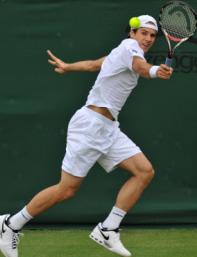 heat, earning another three break points in game five and taking the last of them with a forehand winner. Tommy Haas rolled back the years with some vintage tennis to keep his Wimbledon fairytale alive thanks to a stunning quarter-final victory over fourth seed Novak Djokovic. The 31-year-old German, who had never been past the fourth round in ten previous trips to Wimbledon, secured a 7-5, 7-6(6), 4-6, 6-3 victory over his 22-year-old opponent to become the fourth German to reach the semi-finals in the Open era. “It’s unbelievable,” Haas said. “There no words for it. I’m playing my best tennis and getting this far is a great feeling. To be in the semi here really is amazing for me.” Originally unseeded, Haas was elevated to 24 when Gael Monfils withdrew and saved two match points against 11th seed Cilic in his third-round match. Haas, who is the 21st man aged 30 or over to reach the last four in the Open era, belied his age by edging the thrilling baseline rallies and demonstrated his agility with some majestic volleys at the net. Secure on his own serve, Haas gained the only break of the 1st set to take it 7-5 and served for a two-set lead only to be broken to love. He was then forced to save three set points before reeling off five points in a row to crucially take the 2nd set tie-break. “It was huge, maybe the key to my success today,” Haas said. “I got a little careless and, at 3:6 in the tie-break, I was yelling at myself.” Djokovic, who had entered the match having won 12 sets in a row, grabbed a lifeline by taking the close-fought 3rd set quite easily. But in the 4th, Haas edged a tense 4th game on the Djokovic serve. The Serbian saved two break points but Haas maintained the pressure to secure the all-important break and consolidated to move into a 4:1* lead and then held his nerve to serve out for a memorable victory. Haas, whose victory over Djokovic in Halle last month was his first against a top-10 player for two years, knows he will have to find another gear when he takes on Roger Federer. “There is not much this guy can’t do but I will see if I can annoy him a bit,” Haas said. “I’ll give it my best shot.” Federer dealt with Ivo Karlovic‘s powerful serves to secure a 6-3, 7-5, 7-6(3)
heat, earning another three break points in game five and taking the last of them with a forehand winner. Tommy Haas rolled back the years with some vintage tennis to keep his Wimbledon fairytale alive thanks to a stunning quarter-final victory over fourth seed Novak Djokovic. The 31-year-old German, who had never been past the fourth round in ten previous trips to Wimbledon, secured a 7-5, 7-6(6), 4-6, 6-3 victory over his 22-year-old opponent to become the fourth German to reach the semi-finals in the Open era. “It’s unbelievable,” Haas said. “There no words for it. I’m playing my best tennis and getting this far is a great feeling. To be in the semi here really is amazing for me.” Originally unseeded, Haas was elevated to 24 when Gael Monfils withdrew and saved two match points against 11th seed Cilic in his third-round match. Haas, who is the 21st man aged 30 or over to reach the last four in the Open era, belied his age by edging the thrilling baseline rallies and demonstrated his agility with some majestic volleys at the net. Secure on his own serve, Haas gained the only break of the 1st set to take it 7-5 and served for a two-set lead only to be broken to love. He was then forced to save three set points before reeling off five points in a row to crucially take the 2nd set tie-break. “It was huge, maybe the key to my success today,” Haas said. “I got a little careless and, at 3:6 in the tie-break, I was yelling at myself.” Djokovic, who had entered the match having won 12 sets in a row, grabbed a lifeline by taking the close-fought 3rd set quite easily. But in the 4th, Haas edged a tense 4th game on the Djokovic serve. The Serbian saved two break points but Haas maintained the pressure to secure the all-important break and consolidated to move into a 4:1* lead and then held his nerve to serve out for a memorable victory. Haas, whose victory over Djokovic in Halle last month was his first against a top-10 player for two years, knows he will have to find another gear when he takes on Roger Federer. “There is not much this guy can’t do but I will see if I can annoy him a bit,” Haas said. “I’ll give it my best shot.” Federer dealt with Ivo Karlovic‘s powerful serves to secure a 6-3, 7-5, 7-6(3)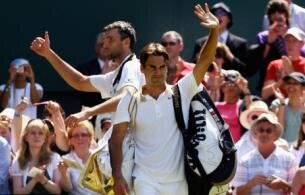 victory against the 22nd seed from Croatia. The win means the Swiss has reached the last 21 semi-finals in the four grand slam tournaments. Federer broke Karlovic’s serve once in each of the first two sets (breaking the Croat at the beginning of the 1st set to lead 3:1, he snapped his record 129 service holds in a row!) and clinched the 3rd set by winning a tie-break 7/3. “It is tough mentally to play someone like Ivo so I’m very happy to have broken him twice to be able to win this match,” the Swiss said. Asked whether he could be in a more confident mood approaching the semi-finals, he replied: “I guess I can’t really be any higher or confident after winning in Paris. Maybe I could have been even more confident if I had won last year. Either way a semi-final is always going to be difficult but I have got there now and I am happy about that.” A feature of Karlovic’s run to the last eight had been his high first-serve percentage, but this time he struggled to keep it much above 60%. In the 3rd set Karlovic even had a glimpse of a break in the 6th game when Federer began with a double fault. A stunning forehand on the run from the Croat made it ‘deuce’ for the first time in the match but two big serves from the world No. 2 snuffed out the chance. Karlovic held firm to force a tie-break but that would not have frightened Federer, who had won 9 of the previous 12 tie-breaks between the pair and he duly gained the first mini-break to make it 3:2. Another mini-break brought up four match points and although Karlovic saved the first with an ace – his 23rd of the match – a forehand winner wrapped up the set – and the match.
victory against the 22nd seed from Croatia. The win means the Swiss has reached the last 21 semi-finals in the four grand slam tournaments. Federer broke Karlovic’s serve once in each of the first two sets (breaking the Croat at the beginning of the 1st set to lead 3:1, he snapped his record 129 service holds in a row!) and clinched the 3rd set by winning a tie-break 7/3. “It is tough mentally to play someone like Ivo so I’m very happy to have broken him twice to be able to win this match,” the Swiss said. Asked whether he could be in a more confident mood approaching the semi-finals, he replied: “I guess I can’t really be any higher or confident after winning in Paris. Maybe I could have been even more confident if I had won last year. Either way a semi-final is always going to be difficult but I have got there now and I am happy about that.” A feature of Karlovic’s run to the last eight had been his high first-serve percentage, but this time he struggled to keep it much above 60%. In the 3rd set Karlovic even had a glimpse of a break in the 6th game when Federer began with a double fault. A stunning forehand on the run from the Croat made it ‘deuce’ for the first time in the match but two big serves from the world No. 2 snuffed out the chance. Karlovic held firm to force a tie-break but that would not have frightened Federer, who had won 9 of the previous 12 tie-breaks between the pair and he duly gained the first mini-break to make it 3:2. Another mini-break brought up four match points and although Karlovic saved the first with an ace – his 23rd of the match – a forehand winner wrapped up the set – and the match.
Semifinals: Geoff Marsh
Tommy Haas approached the assignment in a positive frame of mind. He has been coming here for eleven years, and in that time has endured more than his share of bad luck. So when at last, in the twilight of his career, the German put together a string of performances sufficient to get him to the penultimate hurdle here, he was determined to enjoy the experience. “I’m just going to go play,” he said before the match, and that is just what he did, doing full justice to his enduring skills and providing an honest test for Roger Federer as the Swiss maestro played his 21st consecutive Grand Slam semi-final. Haas’s honest endeavors would prove insufficient, as Federer won 7-6(3), 7-5, 6-3 in a smidgen over two hours, but the multiple champion was given a thorough workout by his 31-year-old opponent. “I thought Tommy was on a great run,” Federer said afterwards, with characteristic generosity. “I couldn’t even get close to breaking him for almost two sets.” But this stage of a  Grand Slam is where you sort the gifted from the genius, and there is little doubt about which side of that line Federer inhabits. The Centre Court crowd have already appointed Federer one of their own, but it is traditional for them also to side with the underdog, so this was one of those matches where the finest shots of both players were applauded with equal fervour. Andy Murray struggled to find his best form against Andy Roddick, and never found an answer to Roddick’s booming serve, losing 4-6, 6-4, 6-7(7), 6-7(5). Murray was punished for being too passive in the opening set and, although he bounced back in the second, Roddick’s bullet serving and consistent all-round game earned him a third Wimbledon final appearance against Federer. Murray said: “You always expect your opponents to play well at this stage of the tournament. I had a few chances in the first tie-break and chances early in the third set and I didn’t take them. I thought I played well. He served really, really well. Hitting at that pace at such a high percentage, sometimes there’s not a whole lot you can do.” Roddick, 26, said: “I had to play my best tennis to win today. Not many people were giving me much of a chance. Throughout my career I’ve had a lot of shortcomings but trying hard isn’t one of them. He had all the pressure on him. It’s just a dream.” Roddick began in typical fashion with two aces in the opening game. And the American immediately took Murray, who was bidding to become the first British male singles finalist since Bunny Austin in 1938, to ‘deuce’ – only to see two aces flying past him. The Scot unsurprisingly looked a little nervous, and Roddick showed his phenomenal serve was working well by sending down the fastest delivery of the tournament at 143 mph. Murray was struggling to find his first serve rhythm but his prowess off the ground kept him out of trouble as he made it 3:3 with a classy volley. The 22-year-old was making more errors than usual, perhaps feeling the occasion, and he found himself set point down serving at 4:5 behind thanks to a lovely Roddick drop shot. And the sixth seed took advantage of his first chance with a cross-court forehand that forced Murray to net. The British number one took a comfort break and came back with a newly-aggressive attitude, two forehand passes and a winner down the line giving him three break points, and he took the first one when Roddick netted a forehand. The crowd were suddenly engaged and three consecutive aces helped Murray to consolidate the break. The third seed’s first-serve percentage in the opening set was less than 50% but suddenly the aces were flying off his racquet as he easily kept his opponent at bay. A nervy service game at 4:3, in which the Scot was taken to ‘deuce’, hinted at a chance for Roddick but Murray held firm. And serving for the set he was rock solid, although the first serve again let him down, as he leveled the match. The 3rd set began in identical fashion to the second as Murray, with the help of a lucky net cord, moved to 0/40 on the Roddick serve. But this time the American came up with the goods, a superb lunging volley at 30/40 denying his opponent a second break of serve. Murray’s first-serve percentage had again dropped below 50% and he paid the price in a dramatic fourth game. He saved three break points but a fourth proved too much and Roddick seized the advantage. The Scot was clearly frustrated and he was warned for an audible obscenity, something he disputed strongly with the umpire. Murray was not finished though, and when Roddick served for the set at 5:3 he pounced, winning
Grand Slam is where you sort the gifted from the genius, and there is little doubt about which side of that line Federer inhabits. The Centre Court crowd have already appointed Federer one of their own, but it is traditional for them also to side with the underdog, so this was one of those matches where the finest shots of both players were applauded with equal fervour. Andy Murray struggled to find his best form against Andy Roddick, and never found an answer to Roddick’s booming serve, losing 4-6, 6-4, 6-7(7), 6-7(5). Murray was punished for being too passive in the opening set and, although he bounced back in the second, Roddick’s bullet serving and consistent all-round game earned him a third Wimbledon final appearance against Federer. Murray said: “You always expect your opponents to play well at this stage of the tournament. I had a few chances in the first tie-break and chances early in the third set and I didn’t take them. I thought I played well. He served really, really well. Hitting at that pace at such a high percentage, sometimes there’s not a whole lot you can do.” Roddick, 26, said: “I had to play my best tennis to win today. Not many people were giving me much of a chance. Throughout my career I’ve had a lot of shortcomings but trying hard isn’t one of them. He had all the pressure on him. It’s just a dream.” Roddick began in typical fashion with two aces in the opening game. And the American immediately took Murray, who was bidding to become the first British male singles finalist since Bunny Austin in 1938, to ‘deuce’ – only to see two aces flying past him. The Scot unsurprisingly looked a little nervous, and Roddick showed his phenomenal serve was working well by sending down the fastest delivery of the tournament at 143 mph. Murray was struggling to find his first serve rhythm but his prowess off the ground kept him out of trouble as he made it 3:3 with a classy volley. The 22-year-old was making more errors than usual, perhaps feeling the occasion, and he found himself set point down serving at 4:5 behind thanks to a lovely Roddick drop shot. And the sixth seed took advantage of his first chance with a cross-court forehand that forced Murray to net. The British number one took a comfort break and came back with a newly-aggressive attitude, two forehand passes and a winner down the line giving him three break points, and he took the first one when Roddick netted a forehand. The crowd were suddenly engaged and three consecutive aces helped Murray to consolidate the break. The third seed’s first-serve percentage in the opening set was less than 50% but suddenly the aces were flying off his racquet as he easily kept his opponent at bay. A nervy service game at 4:3, in which the Scot was taken to ‘deuce’, hinted at a chance for Roddick but Murray held firm. And serving for the set he was rock solid, although the first serve again let him down, as he leveled the match. The 3rd set began in identical fashion to the second as Murray, with the help of a lucky net cord, moved to 0/40 on the Roddick serve. But this time the American came up with the goods, a superb lunging volley at 30/40 denying his opponent a second break of serve. Murray’s first-serve percentage had again dropped below 50% and he paid the price in a dramatic fourth game. He saved three break points but a fourth proved too much and Roddick seized the advantage. The Scot was clearly frustrated and he was warned for an audible obscenity, something he disputed strongly with the umpire. Murray was not finished though, and when Roddick served for the set at 5:3 he pounced, winning 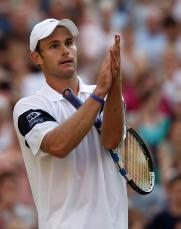 the first three points and then taking his second break point. An ace saw Murray level at 5-all and two games later came the first tie-break. The pair traded mini-breaks early on but two aces from the third seed took him to set point at 6:5. Roddick saved that one, as did Murray on his own serve, but a wayward forehand gave the American a chance on his serve and he took an epic set 9/7 when the Scot netted. Murray did not let the disappointment affect him at the start of the 4th set and he created a mini-set point in the 8th game when Roddick volleyed long, but the American saved it in immaculate fashion. The sixth seed was still serving at 75% of first serves in and he held firm to set up a second tie-break. There were signs of fatigue in the Murray game, and a weak forehand gave Roddick the first mini-break. The British number one hung in there with a backhand pass onto the side-line but a backhand that missed by a fraction set up a first match point for Roddick on his serve. Murray spectacularly saved that with another backhand pass but he could not save a second on his own serve and a backhand into the net left Roddick celebrating a hugely impressive victory. The American said of his opponent: “He’s been a much better player than I have over the last year but I was a little bit better today.”
the first three points and then taking his second break point. An ace saw Murray level at 5-all and two games later came the first tie-break. The pair traded mini-breaks early on but two aces from the third seed took him to set point at 6:5. Roddick saved that one, as did Murray on his own serve, but a wayward forehand gave the American a chance on his serve and he took an epic set 9/7 when the Scot netted. Murray did not let the disappointment affect him at the start of the 4th set and he created a mini-set point in the 8th game when Roddick volleyed long, but the American saved it in immaculate fashion. The sixth seed was still serving at 75% of first serves in and he held firm to set up a second tie-break. There were signs of fatigue in the Murray game, and a weak forehand gave Roddick the first mini-break. The British number one hung in there with a backhand pass onto the side-line but a backhand that missed by a fraction set up a first match point for Roddick on his serve. Murray spectacularly saved that with another backhand pass but he could not save a second on his own serve and a backhand into the net left Roddick celebrating a hugely impressive victory. The American said of his opponent: “He’s been a much better player than I have over the last year but I was a little bit better today.”
Final: Christopher Clarey
On and on they held serve as the fifth set of the Wimbledon men’s final endured beyond all precedent. On and on, with shadows encroaching on the grass, Andy Roddick kept pace with Roger Federer on Centre Court as Federer attempted to close in on a record 15th Grand Slam singles title. But as cruel as the concept began to seem as both players continued to invest in the outcome, Wimbledon’s latest epic had to finish. And as poignant as it should seem to those who know how long Roddick has been chasing sunlight in Federer’s shadow, Federer was the one who again ended up holding the trophy. Roddick, in the midst of a resurgent season, had hoped to postpone Federer’s record-making, but despite playing what looked very much like the match of his life, Roddick could succeed only in turning Sunday’s final into Wimbledon’s latest classic as Federer won by the remarkable score of 5-7, 7-6(6), 7-6(5), 3-6, 16-14. Roddick held his serve 37 times in a row before being broken in the last game. When Roddick’s last shot, a forehand, missed its target, Federer roared and walked to the net all alone in the record books after breaking his tie with Pete Sampras, who is now second on the career men’s list with 14 major singles titles. “Sorry, Pete; I 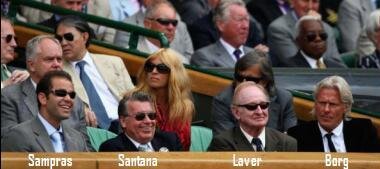 tried to hold him off,” Roddick said to Sampras, his American compatriot, who was sitting in the front row of the royal box after flying in from Los Angeles on Sunday morning. Sampras did not take his seat next to the former champions Rod Laver, Manuel Santana and Bjorn Borg until after the first three games had ended, but Federer, despite being deep into his match, took the time to greet Sampras just the same. “I said hello to him, which is unusual,” Federer said. “But I thought, I don’t want to be rude, you know.” Despite his tardy arrival, Sampras would get to watch plenty of tennis as Federer served a career-high 50 aces (Roddick 27, service winenrs: Fed 38, A-Rod 71) in this 4-hour-18-minute final. “It was an epic, it really was,” said Sampras, who said he now believed Federer was the greatest player ever. “He’s a friend, a great player, a good guy,” Sampras said. “He’s got 15. He could get 17, 18 majors when it’s all done. He’s a stud.” The fifth set Sunday was by far the longest in a Grand Slam singles final in terms of games played, which is quite a statistic considering that Wimbledon began in 1877. The previous longest was in 1927, when René Lacoste of France beat Bill Tilden of the United States, 11-9, in the fifth set at the French championships. Sunday’s victory gave Federer his sixth Wimbledon title to go with the five he won from 2003 to 2007. The victory will also allow him to regain the No. 1 ranking Monday from Rafael Nadal, who was unable to defend his title here
tried to hold him off,” Roddick said to Sampras, his American compatriot, who was sitting in the front row of the royal box after flying in from Los Angeles on Sunday morning. Sampras did not take his seat next to the former champions Rod Laver, Manuel Santana and Bjorn Borg until after the first three games had ended, but Federer, despite being deep into his match, took the time to greet Sampras just the same. “I said hello to him, which is unusual,” Federer said. “But I thought, I don’t want to be rude, you know.” Despite his tardy arrival, Sampras would get to watch plenty of tennis as Federer served a career-high 50 aces (Roddick 27, service winenrs: Fed 38, A-Rod 71) in this 4-hour-18-minute final. “It was an epic, it really was,” said Sampras, who said he now believed Federer was the greatest player ever. “He’s a friend, a great player, a good guy,” Sampras said. “He’s got 15. He could get 17, 18 majors when it’s all done. He’s a stud.” The fifth set Sunday was by far the longest in a Grand Slam singles final in terms of games played, which is quite a statistic considering that Wimbledon began in 1877. The previous longest was in 1927, when René Lacoste of France beat Bill Tilden of the United States, 11-9, in the fifth set at the French championships. Sunday’s victory gave Federer his sixth Wimbledon title to go with the five he won from 2003 to 2007. The victory will also allow him to regain the No. 1 ranking Monday from Rafael Nadal, who was unable to defend his title here 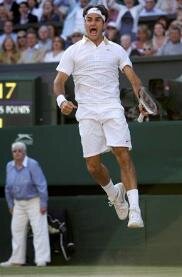 because of knee problems. Nadal beat Federer in a five-set final last year that drew rave reviews. But this year’s final certainly deserves a place on the shortlist of great Wimbledon matches. “Last year’s final was different,” Federer said. “It was night at the end. The rallies were from the backcourt and not just on serve and return of serve. I told myself today at 13:13 in the 5th set, ‘I’m exactly where I want to be, just a few points from victory.’ Sure, you can look at things negatively, but my positive side is important, and I really believed right until the end. Unfortunately Rafa was too strong last year. But this year, I had luck on my side.” This year, once again, Roddick did not. “Sports or tennis is cruel sometimes; we know it,” Federer said. “I went through some five-setters in Grand Slam finals, too, and ended up losing. It’s hard. But I think he did great.” Roddick, 26, has long been Federer’s foil, losing 18 of their 20 previous matches and never pushing him to a fifth set in their seven previous meetings in Grand Slam tournaments. Federer beat Roddick in the 2004 and 2005 Wimbledon finals and then beat him again in the 2006 United States Open final, which was the last time Roddick advanced this far at a major. But at a stage in his career when others might have lost faith or motivation, Roddick has improved his game and fitness, shuffled his support team by hiring Larry Stefanki as coach and become better at channeling his nervous energy and ambition. Roddick held it together remarkably well Sunday, even after he blew a huge opportunity to win the 2nd-set tie breaker, which he led by 6:2 before Federer managed to reel off the next six points and tie the match at one set apiece. In failing to convert any of his four set points in the tie breaker, the one that will surely stick with Roddick is the fourth. He squandered it at 6:5 when Federer struck a topspin forehand passing shot down the line and Roddick missed a high backhand volley with a relatively open court available. Roddick walked off the court immediately after the set, and when he returned, he still looked shaken, heading to the wrong side of the court and asking for the ball when in fact it was Federer’s turn to serve. But Roddick soon took his proper spot on the grass. To his credit, he kept his focus. “There’s no way it doesn’t cross your mind,” he said later of the lost set. “We’re human. We’re not cyborgs. You know, at that point, like everything else, there’s two options. You lay down or you keep going. The second option sounded better to me.” And so he resumed slamming huge first serves under pressure, putting 70 percent in play during the match. But he did much more. His two-handed backhand, once considered a liability, was a
because of knee problems. Nadal beat Federer in a five-set final last year that drew rave reviews. But this year’s final certainly deserves a place on the shortlist of great Wimbledon matches. “Last year’s final was different,” Federer said. “It was night at the end. The rallies were from the backcourt and not just on serve and return of serve. I told myself today at 13:13 in the 5th set, ‘I’m exactly where I want to be, just a few points from victory.’ Sure, you can look at things negatively, but my positive side is important, and I really believed right until the end. Unfortunately Rafa was too strong last year. But this year, I had luck on my side.” This year, once again, Roddick did not. “Sports or tennis is cruel sometimes; we know it,” Federer said. “I went through some five-setters in Grand Slam finals, too, and ended up losing. It’s hard. But I think he did great.” Roddick, 26, has long been Federer’s foil, losing 18 of their 20 previous matches and never pushing him to a fifth set in their seven previous meetings in Grand Slam tournaments. Federer beat Roddick in the 2004 and 2005 Wimbledon finals and then beat him again in the 2006 United States Open final, which was the last time Roddick advanced this far at a major. But at a stage in his career when others might have lost faith or motivation, Roddick has improved his game and fitness, shuffled his support team by hiring Larry Stefanki as coach and become better at channeling his nervous energy and ambition. Roddick held it together remarkably well Sunday, even after he blew a huge opportunity to win the 2nd-set tie breaker, which he led by 6:2 before Federer managed to reel off the next six points and tie the match at one set apiece. In failing to convert any of his four set points in the tie breaker, the one that will surely stick with Roddick is the fourth. He squandered it at 6:5 when Federer struck a topspin forehand passing shot down the line and Roddick missed a high backhand volley with a relatively open court available. Roddick walked off the court immediately after the set, and when he returned, he still looked shaken, heading to the wrong side of the court and asking for the ball when in fact it was Federer’s turn to serve. But Roddick soon took his proper spot on the grass. To his credit, he kept his focus. “There’s no way it doesn’t cross your mind,” he said later of the lost set. “We’re human. We’re not cyborgs. You know, at that point, like everything else, there’s two options. You lay down or you keep going. The second option sounded better to me.” And so he resumed slamming huge first serves under pressure, putting 70 percent in play during the match. But he did much more. His two-handed backhand, once considered a liability, was a  strength as he hit multiple passing-shot winners down the line. Roddick also volleyed and half-volleyed well and hit crisp and intelligent approach shots. Even the baseline rallies were more balanced. Yet this match was still defined by the serving; Federer and Roddick made aces and service winners seem routine and the few extended rallies seemed worthy of savoring. It was not until the score was 10-all that the fifth set passed the hour mark. By then Federer had already saved two mini-match points in the 17th game: the first at 15/40 with a first serve that Roddick could not return and the second at 30/40 with a forehand swing volley winner. Those were the last break points Roddick had, but this final still had a long way to run. “You just keep going,” Roddick
strength as he hit multiple passing-shot winners down the line. Roddick also volleyed and half-volleyed well and hit crisp and intelligent approach shots. Even the baseline rallies were more balanced. Yet this match was still defined by the serving; Federer and Roddick made aces and service winners seem routine and the few extended rallies seemed worthy of savoring. It was not until the score was 10-all that the fifth set passed the hour mark. By then Federer had already saved two mini-match points in the 17th game: the first at 15/40 with a first serve that Roddick could not return and the second at 30/40 with a forehand swing volley winner. Those were the last break points Roddick had, but this final still had a long way to run. “You just keep going,” Roddick 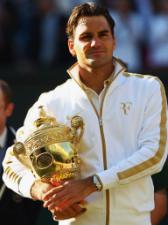 said. “Looking back it seems like a lot, but each time it was just a point, and then another one and another one.” But the numbers on the scoreboard eventually stopped changing. When Roddick served at 14:15 (40/30), his timing seemed suspect. He made unforced errors on backhand, then mis-hit another backhand to make it deuce for the second time. On the next point, Federer hit a backhand chip return that landed short. Roddick hustled forward but missed his forehand long. It was championship point, and when Roddick missed his serve, there were shrieks of anticipation. Roddick, after saving six break points in the match, did not save this one or the match. But there was some small consolation. The Centre Court crowd, accustomed to seeing Federer with the trophy, was in no mood to forget the man who finished second. The chants of “Ro-ger” were followed by chants of “Rodd-ick.” “I feel bad for Andy, I really do,” Sampras said. “This was his chance. He came up short, but Roger, the great ones at the end, he just had a little bit more.” Federer’s 60th title. Stats of the final
said. “Looking back it seems like a lot, but each time it was just a point, and then another one and another one.” But the numbers on the scoreboard eventually stopped changing. When Roddick served at 14:15 (40/30), his timing seemed suspect. He made unforced errors on backhand, then mis-hit another backhand to make it deuce for the second time. On the next point, Federer hit a backhand chip return that landed short. Roddick hustled forward but missed his forehand long. It was championship point, and when Roddick missed his serve, there were shrieks of anticipation. Roddick, after saving six break points in the match, did not save this one or the match. But there was some small consolation. The Centre Court crowd, accustomed to seeing Federer with the trophy, was in no mood to forget the man who finished second. The chants of “Ro-ger” were followed by chants of “Rodd-ick.” “I feel bad for Andy, I really do,” Sampras said. “This was his chance. He came up short, but Roger, the great ones at the end, he just had a little bit more.” Federer’s 60th title. Stats of the final






















Federer vs. Haas
Federer vs. Roddick
Most consecutive games won on serve:
129 – Ivo Karlovic (2009, Queens Club & Wimbledon)
121 – John Isner (2014, Cincinnati, Winston-Salem, US Open, Davis Cup & Beijing) *
116 – Roger Federer (2015, Halle & Wimbledon)
111 – Wayne Arthurs (1999, including qualies; Wimbledon)
109 – Wayne Arthurs (2005, including qualies; Scottsdale, Davis Cup & Indian Wells)
105 – Roger Federer (2004, Halle & Wimbledon)
102 – Joachim Johansson (2004, Moscow, Madrid & Stockholm) **
98 – Richard Krajicek (1997, Halle, Rosmalen & Wimbledon) **
98 – Andy Roddick (2005, Lyon & Paris)
97 – Pete Sampras (1997, Wimbledon)
92 – Mardy Fish (2003, Cincinnati)
88 – Rafael Nadal (2013, US Open)
87 – Pete Sampras (2001, US Open)
86 – John Isner (2015, Madrid & Rome)
84 – John Isner & Nicolas Mahut in a match against each other (2010, Wimbledon – Mahut 85 actually)
80 – Ivo Karlovic (2013, Newport & Bogota)
* Isner withdrew during the streak (Winston-Salem)
** Perhaps 1-2 games more